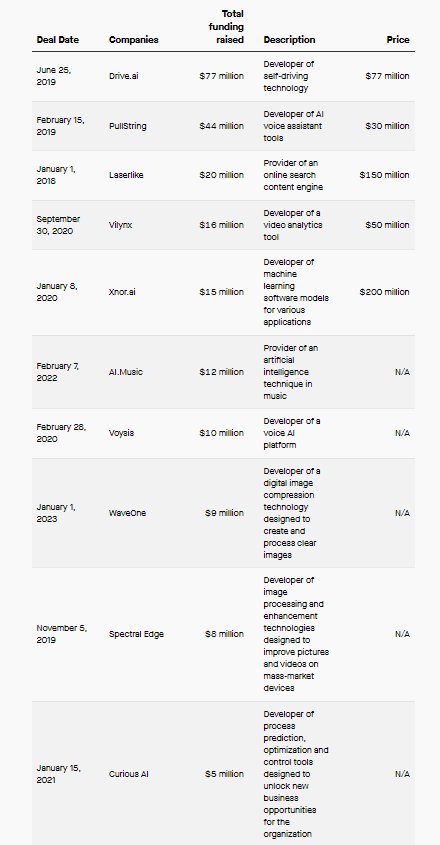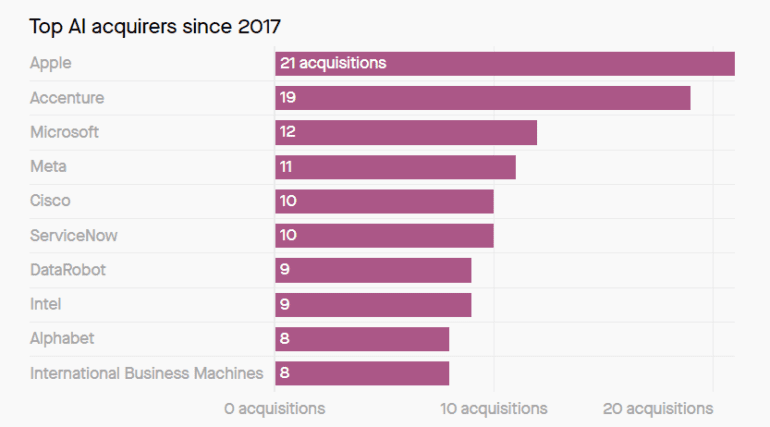TL;DR:
- Despite its low-key approach, Apple has been the top buyer of AI and machine learning companies since 2017.
- Apple has acquired 21 AI startups, outpacing Microsoft and Meta.
- The company’s AI investments are driving innovations in products like the iPhone and MacBook.
- Apple’s secretive strategy contrasts with Microsoft and Google’s transparent AI product announcements.
- The acquisition landscape for tech giants is shifting due to increased antitrust scrutiny.
- Amazon’s substantial investment in AI startup Anthropic mirrors Microsoft’s collaboration with OpenAI.
Main AI News:
In the realm of artificial intelligence, the behemoths of Big Tech – Google, Microsoft, Meta, and Amazon – are renowned for their relentless chatter about AI investments. Their discussions on this front echo loudly in earnings calls and resound through the corridors of new product unveilings. Curiously, amidst this AI cacophony, there exists a conspicuous silence from a significant industry player: Apple.
However, appearances can be deceiving. Behind Apple’s veiled public discourse lies a well-guarded secret. Since 2017, Apple has quietly emerged as the foremost patron of AI and machine learning companies, as per the discerning observations of market research firm PitchBook. This surreptitious AI buying spree by Apple serves as a testament to the technology’s pivotal role in shaping the future of their consumer products, spanning from the iconic iPhone to the sleek MacBook.
The numbers don’t lie: Apple has stealthily acquired 21 AI startups since 2017, a tally that nearly doubles the combined count of acquisitions made by Microsoft and Meta. Accenture, the global consulting juggernaut, follows closely in second place, albeit at a considerable distance.
The question naturally arises: why does Apple shroud its AI endeavors in secrecy, avoiding the customary investor and analyst conference calls? Apple’s enigmatic CEO, Tim Cook, provides a succinct answer: “[W]e tend to announce things as they come to market, and that’s our m.o., and I’d like to stick to that.”
This stance diverges markedly from the openness displayed by Microsoft and Google, who eagerly trumpet every AI product launch. Their motivations are twofold: real-time feedback for product enhancement and bolstering their AI offerings. As Scott Beechuk, a Norwest enterprise investor, recently noted, transparency fuels their quest for AI excellence.
Delving into Apple’s AI acquisitions, we discern a strategic focus on self-driving technology, voice design, music generation, and image recognition. These acquisitions align seamlessly with Apple’s recent iPhone innovations, such as personalized voice generation and live voicemail, both enabled by the profound capabilities of AI and machine learning. Tim Cook himself underscored this fact during an August conference call with investors and analysts, shedding light on the company’s extensive research in generative AI over the years.
Apple’s modus operandi stands in stark contrast to the approaches adopted by Microsoft and Google. While these tech giants publicize their AI products with gusto, they exercise restraint in the acquisition arena. Heightened antitrust scrutiny has made mergers and acquisitions a treacherous path, prompting them to collaborate with startups instead of outright buyouts. This trend is exemplified by Amazon’s recent announcement of a substantial investment of up to $4 billion in Anthropic, the AI chatbot creator. It harkens back to Microsoft’s own strategic partnership with OpenAI, underscoring the evolving dynamics of big tech’s engagement with AI startups.

Source: G/O Media
Conclusion:
Apple’s covert dominance in the AI realm, marked by 21 acquisitions since 2017, signifies a strategic bet on AI’s integral role in future consumer tech products. Tim Cook’s guarded approach, while in contrast to rivals, reflects a commitment to surprising the market with innovations. This shift in AI acquisition strategy, amidst heightened antitrust scrutiny, reflects a broader trend of big tech companies forging strategic partnerships with AI startups, shaping the landscape of technological advancement in the coming years.

